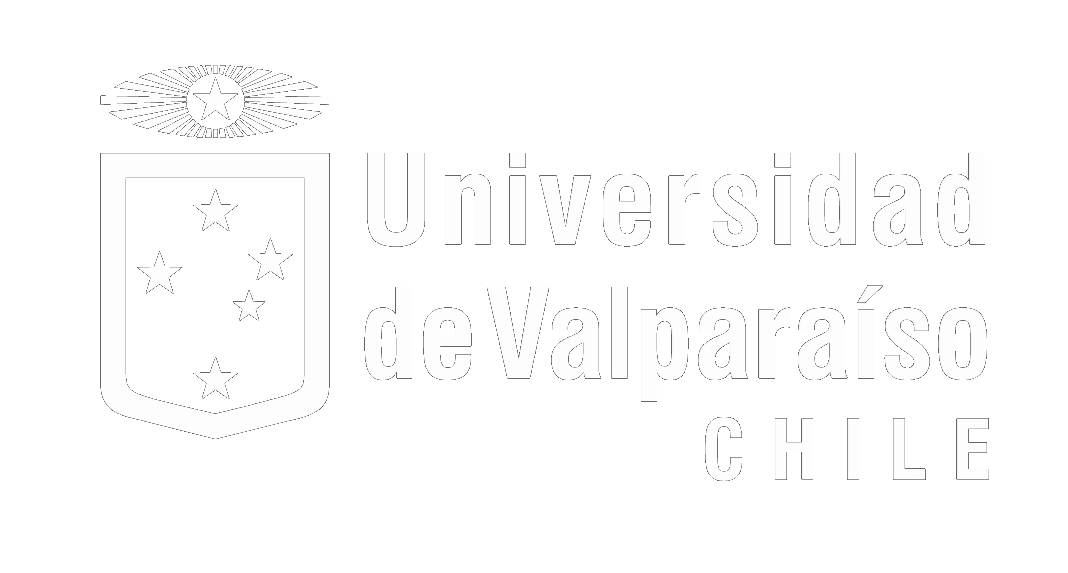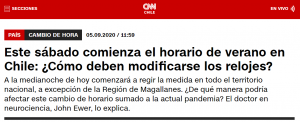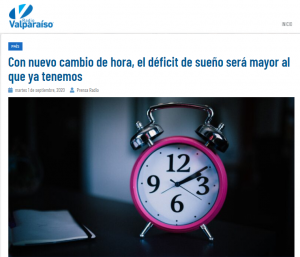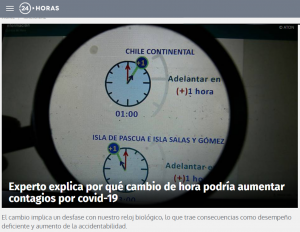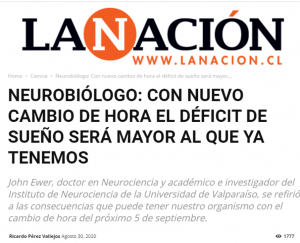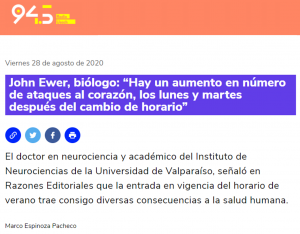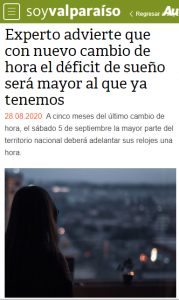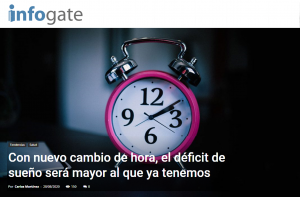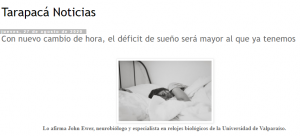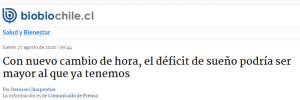
There are some hours when some substances are more active than others, which is hampered by time changes. For example, the highest cortisol secretion is at the beginning of the light period, whereas the melatonin secretion is during the dark period.
Published in El Mostrador on September 01, 2020
Translated by Maia Zabel
This Saturday, September 5th, the clocks must be advanced by one hour to start Daylight Saving Time. The measure will be applied in the midst of the coronavirus pandemic, which has resulted -a product of lockdown- in a deterioration of the quality of sleep in people, according to what was recently revealed by a Belgian study.
The researcher at the Centro Interdisciplinario de Neurociencia (CINV) from the University de Valparaíso and specialist in biological clocks, John Ewer, explains that currently with the confinement “the quality of sleep must be bad, because under confinement we are exposed to less natural light and also to the light of screens until late”.
With this, Ewer says “our biological clock is delayed, and the sleep hormone is inhibited until later. The overall result is that we fall asleep later. Even if we sleep longer, some of those hours are at times when we should normally be awake so the quality of sleep is not as good; therefore, we end up less rested. In addition, there is a lot of anxiety everywhere: the fear of getting infected; a loved one getting infected or to infect a loved one; working at home with children who require care; not being able to go out, etcetera, etcetera, etcetera”.
For the specialist, “the time change will naturally make us wake up later and if there are schedules (alarm clock), then we will have a greater sleep deficit than we already have.” The body never gets used to this time change. What happens is that “as time goes by, we get closer to summer and, therefore, the sun rises a little earlier every day”.
Why do we sleep?
John Ewer clarifies that sleep is essential for people’s health. Scientific literature indicates that physiological processes, which occur at night and during the day, are in many cases determined by exposure to natural light (cycles of light and dark), for example the secretion of the hormones melatonin, cortisol or of growth hormone.
Thus, there are hours when some substances are more active than others. For example, the highest cortisol secretion is at the beginning of the light period, whereas the melatonin secretion is during the dark period.
In the same way, Ewer anticipates that “the truth is that it is not known why we sleep. But all animals from the simplest to the most complicated have periods of rest. What we do know is that sleep is vital: if an animal does not sleep it dies, more or less, at the same time that it dies if it does not eat (having freely available water). With humans you do not have that data, but most likely it is the same way. We are animals after all”.
Regarding the risks we face if we do not improve the quality of sleep, the neurobiologist points out that “the sleep deficit affects our performance and alertness. If the lack of sleep is chronic then a so-called “metabolic syndrome” can develop, which includes hypertension, diabetes and obesity. And some types of cancer increase, for example colon, breast and prostate cancer”.
Among the recommendations given by the researcher the most important is to expose oneself as much as possible to natural light, especially in the morning. And avoid light, especially from screens of any kind at night.
Read this interview in El Mostrador
You also may be interested in: Cambio de hora: ¿Por qué es necesario legislar?
Download the Law Project Here
Daylight Saving Time in pandemic: experts warn that sleep deficit will be greater than the one we already have

They warn that the body never gets used to that time change. Situation that is added to those experienced in these months such as difficulty in falling asleep, staying asleep or waking up too early.
Published in La Tercera on August 31
Wake up at 2 or 3 in the morning. Taking a long time to fall sleep. Even recurring nightmares. Since March, many people report that they do not have a restful and satisfying sleep. During the pandemic the quality of sleep has been affected.
Acute or short-term insomnia is the difficulty in falling asleep, staying asleep or waking up too early, according to the fifth edition of the Diagnostic and Statistical Manual of Mental Disorders (DSM) of the American Psychiatric Association (APA, , its acronym in English). As a result, there is an effect on the quality of life with increased stress.
A survey of nearly 1,000 people conducted by SleepHelp.org foundthat 22% of respondents had had poorer quality sleep during the pandemic..
In April, a Chinese study published in Frontiers in Psychiatry indicated that healthcare workers were prone to insomnia and experienced feelings of depression, anxiety and trauma resulting from it.
But even without insomnia problems, most people have a sleep deficit, explains John Ewer, a researcher at the Centro Interdisciplinario de Neurociencia (CINV) de la Universidad de Valparaíso and a specialist in biological clocks.
To know how much sleep deficiency there is, says Ewer, you must consider the time at which a person naturally wakes up, in which the body is rested and sleeps without a clock or alarm.
If that time is for example 10 in the morning, “it must be reconciled with the alarm, which, if it is at 8 in the morning will imply 2 hours of deficit and the greater the difference the greater the damage,” Ewer emphasizes.
A problem that could be made worse by a new scenario: Daylight Saving Time on Saturday, September 5th. “Now with the time change that deficit will be even worse because 8 o’clock now will be 7 o’clock. Then, in relationship to the previous example, it will be 3 hours of deficit”, explains the researcher.
Worsening sleep problems
A result of the pandemic and the confinement has been the deterioration in the quality of sleep. And the reasons are various. “People are worried, there is anxiety that they are going to infect or that they are going to lose their job. There is also the logistical issue of telecommuting and helping children with school, everything causes a lot of anxiety and stress that affects sleep”, says Ewer.
But we also spend many more hours indoors and less exposed to sunlight, which is what orders our sleep schedules, he explains. “The time the sun rises determines when the biological clock starts”.
There is another factor, he says, the greater exposure to light from screens, “which have blue light that affects the sleep hormone melatonin, it is more difficult to fall asleep, if you don’t sleep at the right time you sleep less well”.
In Chile, according to data from the National Health Survey, more than 820 thousand people (5.6% of the population over 15 years of age) suffer from insomnia, a disorder that can significantly affect general health. In 2017 at the national level more than 2,372 million pesos were spent on freely available products and medicines for sleeping.
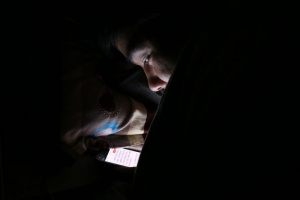
The neurologist and head of the Department of Neurology of the Hospital del Trabajador ACHS, Paulina Chávez, explains that there are several effects resulting from the change in time that can be highlighted as a result of the confinement.
One of them is sleep disorder, especially in the population at risk. We will sleep an hour less, and it is expected that the next day it will be more difficult to wake up, have more sleepiness and therefore less performance, says Chávez. “There is also an imbalance in the biological clock, this happens because the time at which the Sun rises does not coincide with the start of activities. This adapts as the day goes by”.
In addition, there is an increase of cardiovascular disorders. The cause is unknown, but Chávez indicates that apparently there is “greater vulnerability of arrhythmias in people at the end of the night related with the biological clock”.
With the time change we are going to sleep one hour less. One solution might be to go to bed earlier. But you can’t always make that change, Ewer says. “There is not much that can be done, because the problem is that the biological clock determines at what time we wake up and it is determined by the light from the Sun, which is the main source of light”.
The researcher indicates that the body never gets used to this time change. What happens, he says, is that “as time passes, we get closer to summer and therefore the Sun rises a little earlier each day”.
Micro sleep events
Insomnia translates into other very risky problems: micro-sleep events during the day. These are sudden lapses of loss of consciousness behind the wheel, as a result of fatigue or drowsiness.
The risk is that accidents occur due to micro-sleep events, “to the extent that people dismantle their adequate sleep structure” explains Pedro Maldonado, researcher at the BNI Millennium Institute, at the School of Medicine of the University of Chile.
Maldonado participated in a scientific transfer project to contribute to the detection of these events in industries such as large-scale mining, energy and the distribution chain. The initiative, led by researcher Rodrigo Vergara, part of BNI’s innovation program, was carried out with the monitoring company Gauss Control, a national security company established in Chile, Peru and Brazil.
In this work, they determined that the multiple types of microsleep are defined by a length, of more than 1.5 seconds and different associated physical manifestations from a simple closing of the eyes or longer blink, to lowering the head, relaxation of the neck muscle or loss of consciousness for several seconds.
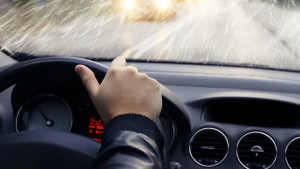
A problem that not only affects drivers. Maldonado points out that it can occur in health professionals, especially those who work in the field of surgery. “When you’re tired, it’s not just fatigue, but also all the pressure on our brain to go into sleep mode. When the person is extremely tired or has not rested enough, the brain can go through these states in a much more violent way”, he explains.
Complex panorama if projections regarding an increase in car use are considered in a post-confinement scenario due to the Covid-19 pandemic. In China, for example, there were increases in vehicle sales and rush hour traffic in cities with normal operation grew 18%.
Read this interview in La Tercera
Other related news


